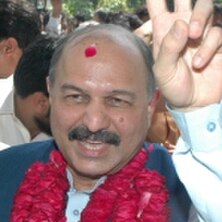Pakistani presidential election, 2008
|
|
|||||||||||||||||
|---|---|---|---|---|---|---|---|---|---|---|---|---|---|---|---|---|---|
|
|||||||||||||||||
|
|||||||||||||||||
|
|||||||||||||||||
An indirect presidential election was held on 6 September 2008 in Pakistan. The Electoral College of Pakistan – a joint sitting of the Senate, National Assembly and Provincial Assemblies – elected a new President after the resignation of President Pervez Musharraf. As required by the constitution, Muhammad Mian Soomro (in his position as Chairman of the Senate of Pakistan) automatically became acting President on 18 August 2008, upon the resignation of Musharraf. The constitution required that a new President be elected by Parliament within 30 days; Soomro was considered loyal to Musharraf, and it was considered certain that he would be replaced in that election.
The Electoral College of Pakistan is formed by a joint sitting of the six leading political bodies in Pakistan:
So that each province has an equal vote, all provincial assemblies are given exactly 65 votes in the electoral college. This mean that the each member of the Punjab Assembly has 65/370 = 0.176 votes, each member of the Sindh Assembly has 65/166 = 0.392 votes, each member of the Khyber Pakhtunkhwa Assembly has 65/124 = 0.524 votes and each member of the Balochistan Assembly has 65/65 = 1 vote.
The political composition of these bodies at the time of the election was:
Nominations closed on Tuesday 26 August.
Asif Ali Zardari was elected President of Pakistan, as Chief election commissioner Qazi Mohammad Farooq announced that "Asif Ali Zardari secured 241 votes out of the 426 valid votes polled in the parliament," In Sindh, Zardari had 62 of the 65 electoral votes while his 2 main opponents, got zero vote; in Khyber Pakhtunkhwa Zardari got 56 votes against 25 by Siddiqui and one by Hussain; in Baluchistan, 49 votes while Siddiqui and Hussain got 5 and 2 respectively.BBC reported that Zardari "won 419 votes, far more than the 372 votes that would have guaranteed him victory."New York Times said that Zardari would be sworn in "as soon as Saturday night or as late as Monday or Tuesday, diplomats and officials said."
...
Wikipedia


